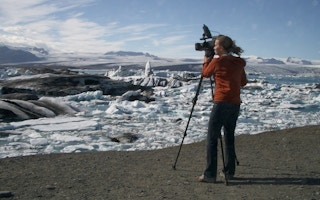We live in a world of tenuous truths, shortened attention spans, competing priorities, and even-more complicated social and political forces. These very forces threaten to disrupt our pathway from Paris to a low-carbon, climate resilient future. Somewhere in the middle, independent media are given the monumental task of looking for truth, and dispelling fake news and bogus science.
And yet, the media’s most crucial task is to build consensus on the hard-and-true fact that if we don’t do something about climate change we threaten to derail economic, environmental and social gains of the past 30 years, and create one big mess for future generations to clean up. This is one of the most important stories of the 21st century, and one that I worryingly suspect will define the historic record of our society.
As countries around the globe come together this November for the climate talks in Bonn, they will re-affirm the need to honour the Paris Agreement, keep global temperature rises below 2°C, and reach the Sustainable Development Goal to “end poverty in all its forms everywhere” by 2030.
On this pathway from Paris, members of the media have the opportunity to serve an essential public good, and share the science, human stories and financial aspects of our changing climate.
From my perspective working at the United Nations Development Programme and the support we provide to communities and governments around the world to adapt to climate change, journalists have a critical role to play to share accurate and essential information and knowledge on climate change to the public. In order to do this, they need to amplify the work already started to critically examine and pass on information on how droughts, floods, extreme weather, rising seas and rising temperatures are affecting economies, health, agriculture, water, conflict and more.
Take this a step further, and they also need to look at how basic human development – ending poverty and ensuring food security – can help us on our pathway from Paris.
This is fundamental.
The media, of course, have a singular role in broadcasting the human story of climate change. Communicating not just the science or the politics or the policies, but real stories about real people whose lives and livelihoods are being affected.
“
In an era where the world’s future can be determined in 140 characters or less, the media need to step up to teach us, to inform us, to shed light on the invisible and often silent stories of climate change.
I think of Mohamed Ismail Yasin, who recently fled a drought in Somalia, traveling some 600 kilometres in the middle of the desert to find water. Sure, Mohamed’s journey underscores the real risk drought and other climate events play – especially in the developing world where things like climate migration, drought and floods take lives, undermine efforts to build stability, and create new and ever-more complex poverty traps.
The media needs to share these stories of risk. But they also need to uncover stories of hope. After Mohamed’s journey, he came to a sand dam built by the government of Somalia. It likely saved his life, and will certainly contribute to a brighter future for his family.
But the story of this simple intervention, out of reach for many given high up-front costs, is not just a feel-good story of one man’s journey. It is a story of how the international community – through funding to international financial institutions such as the Global Environment Facility and Green Climate Fund – can come together to lower risks, reduce climate migration and provide people like Mohamed hope, which is critical in order to build a better future.
Through responsible reporting, an independent media can help build the necessary connections and political support for nations to galvanise ‘climate-smart’ policies, create effective National Adaptation Plans, reduce carbon emissions via their Nationally Determined Contributions, and open up the vital national dialogues that will inform a climate-resilient future.
In this sense, the media serve as bridge builders and knowledge brokers to connect the essential players that will need to come together to ensure that international climate finance is spent properly, climate actions are effective and sustainable, and the various tiers of governments, civil society, the private sector, and at-risk communities, can come together to build the type of transformational change required to meet the goals outlined in Paris.
Finally, with so many of those at the front lines of the impact of climate change inevitably poor and marginalised, media also play an essential role in amplifying messages and serving as a voice for those who have none. This is not only a significant but critical responsibility of the media.
In an era where the world’s future can be determined in 140 characters or less, the media need to step up to teach us, to inform us, to shed light on the invisible and often silent stories of climate change. The power of the collective and partnerships is so important to build the consensus we so badly need to create a climate resilient future and greener planet for generations to come.
Pradeep Kurukulasuriya is head of climate change adaptation at the Global Environmental Finance Unit at UNDP. This story was published with permission from Thomson Reuters Foundation, the charitable arm of Thomson Reuters, that covers humanitarian news, women’s rights, corruption and climate change. Visit news.trust.org.











